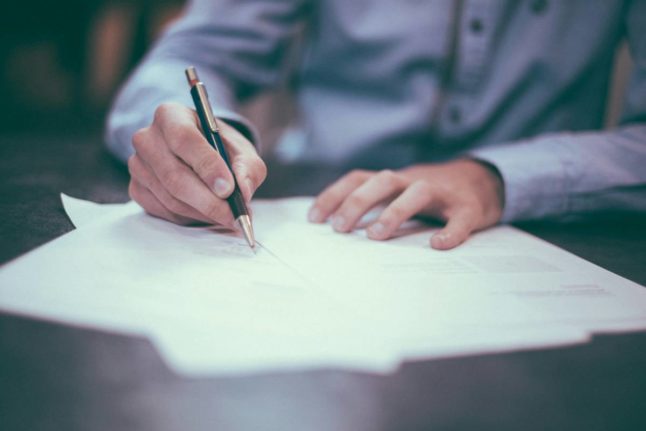DNB
Oslo stock exchange opens down on Friday
The Oslo stock exchange opened on Friday in the red for the first time this week with the benchmark index down 0.3 percent in early trading.

For members
BANKING
What paperwork do you need to open a bank account in Norway
If you're looking to settle, work, or study in Norway, one of the first things you'll need to do is to open a bank account. There are the essential documents and procedures you should be aware of.

While Norway is a highly digitalized society and can often seem almost cashless due to the prevalence of card and app payments, setting up a Norwegian bank account often requires an in-person appointment at a bank branch.
READ MORE: The key things you need to know about opening a bank account in Norway
Be sure to gather all necessary documents beforehand and inquire with your chosen bank about any specific requirements or assistance they may offer for international citizens and non-residents in particular.
Provided you don’t have any special circumstances that can make the process more difficult, such as a limited financial history or no source of income, the entire experience is usually quite straightforward and enjoyable.
And don’t worry; these initial appointments might easily be your only in-person visit to a bank office in Norway. Once you’re a customer, you’ll be able to take care of virtually everything else online (speaking from experience – aside from the first appointment, which was booked for identification purposes four years ago, I haven’t visited the physical premises of my Norwegian bank since).
Obtain an identification number
When opening a bank account as a non-resident, Norwegian banks typically require several documents and pieces of information. One of the first requirements is to have an identification number (usually a temporary one, called the D-number or the permanent National Identity Number).
READ MORE: How to apply for permanent residency in Norway
Note that you need to set aside up to two weeks if you don’t have a temporary identification number (issued to people staying in Norway for less than six months), as it can take some time to get one.
While some Norwegian banks offer the service of ordering a D-number for clients, others do not, so check whether the bank you want to open an account in provides the service.
On the other hand, if you plan to stay or work in Norway for more than six months, you can also apply for a Norwegian National Identity Number issued at the Norwegian Tax Administration’s (Skatteetaten) offices.
If you want to know more about how to switch from a D-number to a ‘fødselsnummer’ at a later point in time, make sure to check The Local’s deep dive into the issue.
Moving on, when opening a bank account as a non-resident, banks typically require several other documents and pieces of information.
Have your proof of identity and work contract on hand
You’ll generally need to show the bank proof of identity and proof of your employment status while opening a bank account in Norway.
Typically, a valid passport serves as the primary form of identification.
READ MORE: Everything foreigners in Norway need to know about electronic IDs
When it comes to providing evidence of your work status, you’ll usually be asked to present your employment or work contract to the bank.
The contract confirms your legal employment in the country and assures the bank of your financial stability.
How to provide confirmation of your address in Norway
Presenting a lease or rental contract will generally serve as sufficient confirmation of your residential address in Norway.
This document establishes your legal residence in the country and ensures that the bank has accurate information for correspondence and regulatory purposes.
Furthermore, your lease or rental contract provides important details about your housing arrangement, including the duration of the lease and rental terms.
Banks rely on this information to verify your physical presence in the country and comply with anti-money laundering regulations.
Having a lease or rental contract on hand demonstrates both stability and commitment to residing in Norway, which can positively impact the bank’s assessment of your application.
Additional documentation (case-by-case basis)
Be prepared for the possibility that the bank may request additional documentation based on your circumstances.
These additional requirements can vary depending on factors such as your residency status, employment situation, or financial history.
READ MORE: How Norway can revoke residency and citizenship over wrong details
If you expect your situation to trigger additional checks, gather any necessary documents in advance to ensure a smooth application process.
For example, if you’re a non-resident planning to stay in Norway for an extended period, the bank may ask for proof of your intended length of stay, such as a visa or residence permit.
Additionally, if you’re self-employed or a freelancer, you may need to provide documentation of your income and tax status, such as tax returns or business registration documents (in my case, the bank asked for both – so come prepared).
Furthermore, people with complicated financial situations, such as multiple sources of income, may be asked to provide additional documentation to verify their financial stability. This could include bank statements, investment portfolios, or proof of other assets.
In some cases, banks may even request reference letters from previous banking institutions or employers to verify your identity and financial history to help them assess your risk profile and ensure compliance with Norway’s regulatory requirements.
You can find out more about the specific requirements that DNB, Norway’s largest bank, has in place regarding the paperwork you’ll need to open an account here, while SpareBank1 conditions can be found here.

 Please whitelist us to continue reading.
Please whitelist us to continue reading.
Member comments